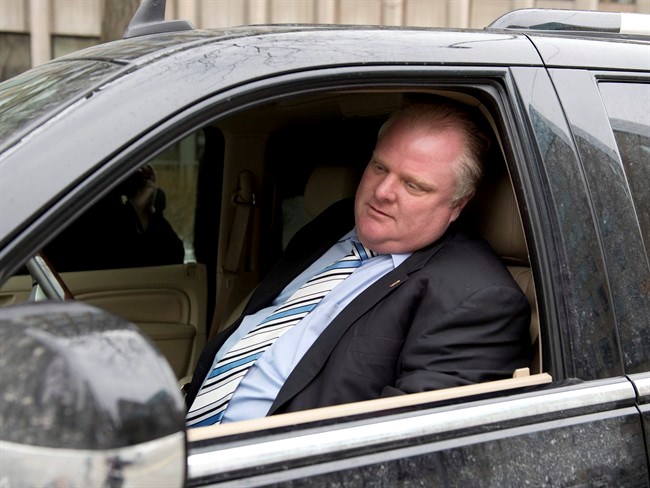TORONTO - Rob Ford's fate as mayor of Toronto rested in the hands of three judges Monday after a day of largely technical arguments for and against a court ruling that he should be removed from office for conflict of interest.
The mayor's lawyer told the Divisional Court panel that Ford was an open and honest politician ordered to forfeit his job by a judge who had misinterpreted the law.
Ford's opponents countered the mayor had deliberately flouted conflict-of-interest rules, and the judge's ruling requires deference as long as it was reasonable.
In calling for Divisional Court to overturn Ford's ouster, lawyer Alan Lenczner said there never was any case against the mayor.
Ford, Lenczner said, gained no financial benefit from fundraising for his private football foundation, and was upfront when he spoke during a council vote that he was only trying to help disadvantaged youth.
"He was perfectly plain and honest," Lenczner told a jammed courtroom. "This is the hallmark of an honest man."
In November, Ontario Superior Justice Charles Hackland ordered Ford removed as mayor for taking part in the vote that he repay $3,150 raised for the foundation. The ruling was put on hold pending Ford's appeal.
Lenczner said Ford's decision to participate was based on his belief that he had done nothing wrong.
"It's not the amount of money that is motivating him to speak and to vote, it's the principle of the thing," the lawyer told the three-judge appeal panel.
In his ruling, Hackland said Ford had shown "wilful blindness" to conflict rules by voting on a matter in which he had a financial interest.
But Lenczner said the judge had failed to give Ford the benefit of a "saving provision" in the conflict act: that his conduct was an error of judgment.
Hackland ruled that Ford received no money personally and found no issue of corruption, Lenczner said.
Lawyers for resident Paul Magder, who brought the initial action against Ford, argued Hackland's ruling should stand.
One of them, Clayton Ruby, rejected the notion Ford had made an "honest, good-faith error in judgment."
The mayor had refused to co-operate with the city's integrity commissioner, who warned Ford against taking part in the vote.
Justice Edward Then called Ruby's characterization unfair.
"Every time (Ford) was told by the city solicitor that he had a conflict, he took that into account," Then said.
Then pointed out that Ford stopped using city letterhead to solicit funds for the foundation and wrote donors to ask if he could return the money.
"The one thing he didn't do is yield on the point of reimbursement," Then said.
"When you're looking at good faith, isn't it important to balance the factors?"
But Ruby countered it was patently unreasonable for Ford to ignore the clear warnings he was in conflict of interest.
Ford, along with his councillor brother, showed little emotion as they watched the proceedings before Then and Justices Lynne Leitch and Katherine Swinton.
For his part, Lenczner said the mayor could not have been expected to understand the legal intricacies at play.
"Mr. Ford is a high school graduate," the lawyer told court.
In a series of technical arguments, Lenczner told the panel that council had no authority in the first place to order Ford to repay the money.
By law, he said, council's only option was to issue a reprimand or dock his pay.
As a result, ordering the mayor to pay back the money was out of order, the lawyer said.
Ruby's colleague, Nader Hasan, rejected that argument, saying council had broader powers allowing it to order repayment.
Even if council did not have the power, Hasan told court, Ford was still clearly wrong to take part in the vote.
Hackland's decision to oust Ford sent shockwaves through the city.
If Ford loses his appeal, he has said he would run in a byelection if council chooses to call one. Council could opt to appoint someone mayor instead of a byelection.
The three Divisional Court judges reserved their decision.



